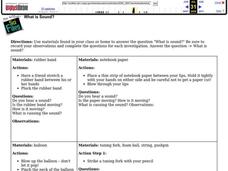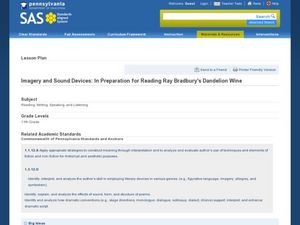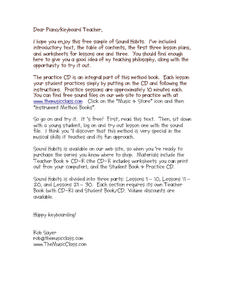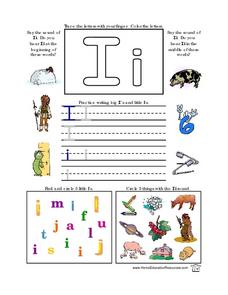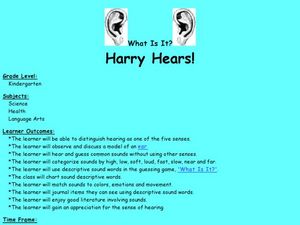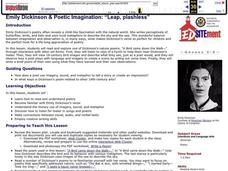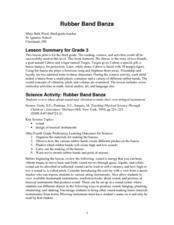Curated OER
What is Sound?
In this sound worksheet, students complete 4 investigations to explore sound. These include the use of a rubber band, a blown up balloon, a piece of notebook paper and a tuning fork with a foam ball, string and pushpin. Students answer...
Curated OER
Now Hear This!
Students create a model of the inner ear. In this hearing lesson, students follow a series of directions to build a working model of the inner ear, then observe how the parts react to a variety of sounds.
Curated OER
Directing Sound Waves
Students learn that sound waves can be directed and collected. In this sound wave experiment, students create and collect sound waves. Students learn sound waves travel differently through different states of matter.
Curated OER
Sound/Pitch
Students explore how pitch changes when using instruments that are plucked, blown, and hit. In this sound and pitch lesson, students blow across the top of bottles that are filled with water to create sound. Students use recorders...
Curated OER
Turn Down Music to Save Hearing
Students participate in a informal survey of their listening habits, then read a news article about the possibility of portable music players harming kids hearing. In this current events lesson, the teacher introduces the article with a...
Curated OER
Sound
Students identify sources and importance of sound, discuss sounds heard on way to school, explain why sound waves can be "seen", and participate in various classroom activities and experiments that illustrate how sound travels.
Curated OER
Sound Energy
Sixth graders understand properties and behavior of heat, light, and sound. They describe the production of sound in terms of vibration of objects that create vibrations in other materials. Students describe how sound is made from...
Curated OER
Sound: What is Sound and how does it travel?
Students learn that vibration makes different types of sounds. In this sound lesson, students perform experiments to understand vibrations and high and low pitch sounds. Students learn that sound travels differently through different...
Curated OER
Sounds Like Science- Bottle Organ
Students investigate the relationship between pitches and notes. In this musical pitches and notes instructional activity, students use different sized bottles, water, and sugar to demonstrate different sounds. Students create musical...
Curated OER
Animal Sounds
Students listen to books about animals. In this animal sound and characteristics lesson plan, students listen to books and a tape of animal and then identify which animal makes that sound. Students discuss and act out how the animal acts.
Curated OER
Imagery and Sound Devices: In Preparation for Reading Ray Bradbury's Dandelion Wine
Twelfth graders analyze Ray Bradbury's use of techniques and elements of fiction as well as nonfiction in the novel Dandelion Wine. In this novel analysis lesson, 12th graders analyze the sensory techniques in Dandelion Wine. Students...
Music Class
Sound Habits
Hear ye! Hear ye! Encourage your young keyboard/piano players to develop sound habits with a resource packet that introduces a dynamic learning method. The free sample lessons, part of a for-purchase program, are designed to be used in a...
Curated OER
Ii- Beginning and Middle Sounds; Printing Practice
In this phonics and printing practice worksheet, students color outlines of the letters I and i. They same the names of 3 pictures while listening for the sound of the I at the beginning of the word. They say the name of three pictures...
Curated OER
A Whale of a Story
Does sound travel faster in water or in the air? Put the question to the test with a science experiment. After reviewing a table of data, third and fourth graders decide which statements are true and which ones are false. The bottom of...
Curated OER
Music: The Circus
Introduce youngsters to the purposeful way in which they can use music. After listening to a circus song and view circus pictures, they hear sounds that introduce, create suspense, and set a tone. This is a good introduction for younger...
Curated OER
Harry Hears!
Students explore ear anatomy and the sense of hearing. In this hearing lesson, students discuss the five senses and view a model of an ear. Students place cotton balls in their ears to simulate loss of hearing. Students use descriptive...
Curated OER
Sound and Hearing
For this sound sources worksheet, students color in the pictures of the sound sources. Students then select words from the list to describe the sound each object makes.
Mr. E. Science
Sound
Since light travels faster than sound, some people may appear bright until you hear them speak. The presentation covers what sound is, how fast it travels in various mediums, properties of sound, hearing, and the parts of the human ear.
Curated OER
A Story About the Ear
Travel through the ear! Use this comprehensive presentation to cover hearing, hearing loss and the treatments paired with different types of hearing loss. Slides are too text-heavy for learners to copy, so provide them with a partially...
Curated OER
Silly Spoonerisms!
Looking for a fun activity for your vocabulary lesson? Bring a activity on "spoonerisms" to your fifth grade class. Kids decipher seven phrases that have mixed up the first letter sounds of each word. They then think of their own...
Curated OER
"Leap, Plashless": Emily Dickinson & Poetic Imagination
Students read and explore one of Emily Dickinson's nature poems, "A Bird Came Down the Walk-" through interaction with a variety of art forms. Clips of a hymn to hear meter and the viewing of bird images exposes them to the language and...
Curated OER
Food Pyramid
Here is an engaging cross-curicular lesson which incorporates elements of language arts and heatlh. Groups of learners are assigned to one vowel sound. They work together to find pictures of food out of a booklet that have the long vowel...
Curated OER
Rubber Band Banza
Third graders review ideas about sound and vibration to make their own stringed instrument. They review what a pictograph and bar graph are. Pupils conduct a survey within the classroom to choose the four favorite string instruments and...
Florida Center for Reading Research
Phonological Awareness: Phoneme Blending, What's My Word?
At a listening station, learners listen to a pre-recorded script; they follow the directions and number each picture on their picture chart corresponding to the segmented phonemes they hear.
Other popular searches
- Sound and Hearing
- Sound, Hearing
- Sound Hearing
- Science Sound and Hearing
- Hearing and Sound Experiment
- Sound and Hearing Worksheets
- Hearing Sound Experiment


